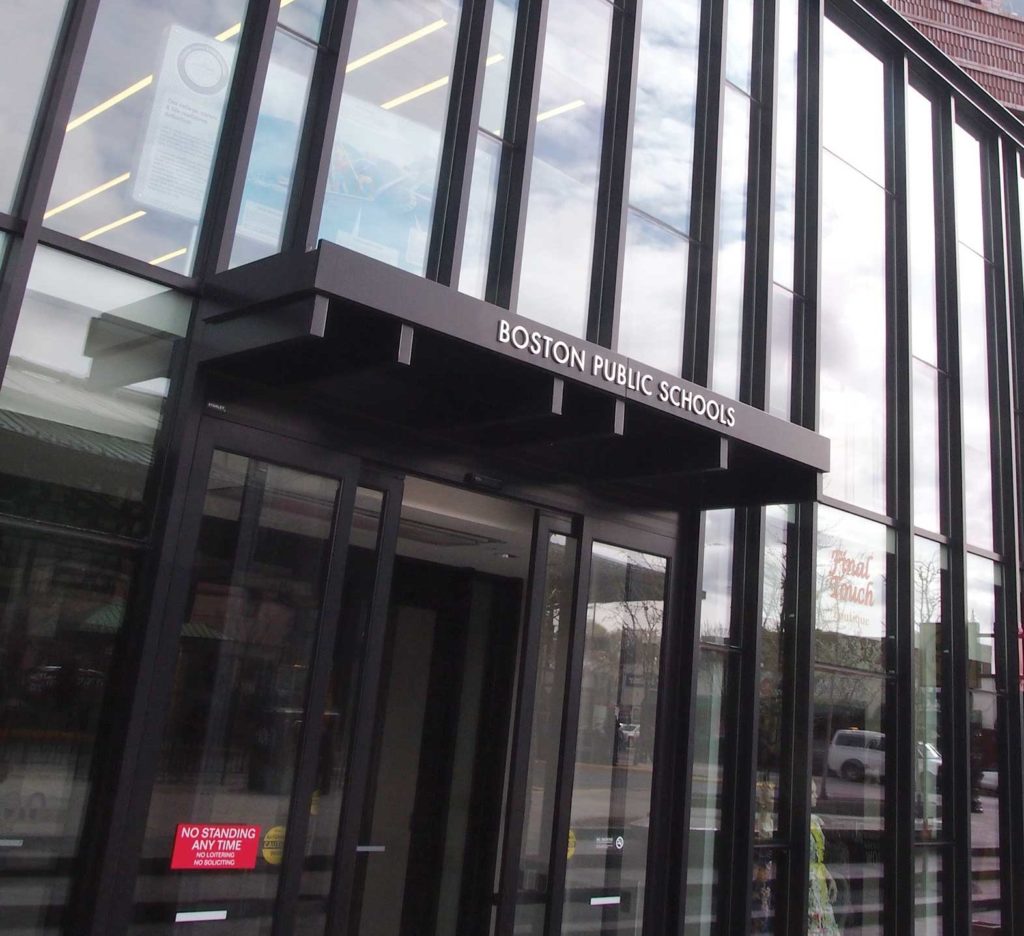Why the call for police in BPS schools?
Education, civil rights advocates pan push for cops, metal detectors

The Council of the Great City Schools last Wednesday released a report on school safety recommending among other things that Boston Public Schools convene a focus group of stakeholders and administrators to consider whether the district should form an internal police department.
After officials from the consulting firm presented their findings to the School Committee and BPS staff on Jan. 18, School Committee member Brandon Cardet-Hernandez wanted to know why the district had commissioned the report in the first place.
“I’m walking away from this with a little confusion around what we’re looking to solve,” he said. “What is the problem that we are trying to address?”
BPS Superintendent Mary Skipper cited last year’s state Department of Elementary and Secondary Education (DESE) audit. That audit suggested the district commission an independent student and staff safety audit to assess safety protocols at schools and make recommendations to ensure safe learning environments for all students across the district, including an evaluation of coordination between BPS and the Boston Police Department.
Ray Hart, executive director of the Council of the Great City Schools, said his firm’s report is simply pointing out areas BPS should explore.
“What we’re recommending here is the conversations,” he said. “There are also some specific things in terms of the ‘why’ that we generated as well.”
But Cardet-Hernandez still wanted his question answered. There were specific failures in special education and transportation that were addressed in reports and policy changes. What data were BPS using to justify a look at a BPS police force?
“Here I’m getting a really important and comprehensive list of things to do, without a clear understanding of what we consider to be the state of the problem,” he said.
A brewing controversy
The exchange during the School Committee meeting is part of a larger debate over the use of uniformed police officers with arrest powers in the Boston Public Schools. During the 2020 election cycle, Mayor Michelle Wu and a majority of those elected to the City Council came out against stationing police in schools.
In 2021, BPS instituted a policy ending the use of police officers in school buildings.
Two weeks ago, however, at-large Councilor Erin Murphy penned a letter, signed by councilors Frank Baker, Michael Flaherty and Ed Flynn, that calls for bringing uniformed officers back to school buildings and deploying metal detectors.
The letter came after a tumultuous first half of the school year. Two students were shot on the streets outside the Jeremiah Burke High School in Grove Hall — one in September, another in October. Then, on Jan. 4, a teacher and student were attacked by three girls outside of the Young Achievers Science and Math Pilot School. The teacher was knocked unconscious.
In her letter, Murphy cited what she said were 744 sexual assaults in BPS schools during the 2021-2022 school year, apparently confusing the district’s number of “sexual misconduct” claims for assaults, which are criminal offenses.
The district reported to DESE that seven students were disciplined for sexual assaults during that school year. The other offenses BPS classified as sexual misconduct include behaviors such as jokes of a sexual nature and students commenting on each other’s bodies. Under Massachusetts law, an assault may involve behaviors ranging from unwanted touching of a person’s genitals, buttocks or breasts to unwanted sexual penetration.
Strong opposition
Last week, 14 education and civil rights advocacy groups, including the Massachusetts Law Reform Institute, Teen Empowerment, Citizens for Public Schools and Black Advocates for Educational Excellence signed on to a letter authored by Massachusetts Advocates for Children blasting Murphy and her co-signatories’ call for school police and metal detectors.
“In this politically-motivated effort to advance school hardening and punitive practices, four White City Councilors organized to advocate for ineffective intervention strategies that will only further criminalize and traumatize Black and Brown children,” the letter reads in part.
Boston Teachers Union members in 2020 voted in favor of a resolution calling for the removal of police in schools. BTU President Jessica Tang says the union remains opposed to police officers in schools.
The controversy in Boston comes amid what many educators describe as an increase in disruptive behavior among BPS students, a development some attribute to the long-term effects of social isolation students experienced during remote learning in 2020 and 2021. But opponents of school police note that the assaults and the two shootings happened outside of school buildings, not inside. There are, in fact, metal detectors inside the Burke building, but the two shootings this year took place on the streets outside the school.
Members of the EdLaw Project, an initiative the Committee for Public Counsel Services runs with youth advocacy groups, sent a letter Dec. 16 to BPS Superintendent Mary Skipper calling on the district to institute restorative justice programs and increase mental health supports in schools — demands echoed in the letter from the 14 education advocacy and civil rights groups.
Looking for data
Pressed by Cardet-Hernandez during last week’s School Committee meeting, Skipper herself seemed unsure why the district had sought advice from the Council of Great City Schools on re-implementing school police.
Skipper, who took over as superintendent in September 2022, said she would speak with former interim superintendent Drew Echelson and DESE officials to determine if there were particular measures the district is trying to meet.
“I’ve not seen them in print anywhere,” she said.
Cardet-Hernandez said, “I think it will be important for us when we come back to really talk [about] what recommendations we will take as a system, to really talk about how we understand the state of the problem. For me, it’s always about students and staff and families and how do we make them safer — but it has be rooted in some sort of data that we’re concerned about.”







